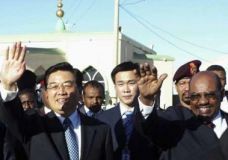US disappointed by Chinese leader’s visit to Sudan
Feb 8, 2007 (WASHINGTON) — The U.S. special envoy to Sudan criticized Beijing on Thursday for not putting economic pressure on Sudan over Darfur and said he was disappointed by the Chinese leader’s last visit to Khartoum.
 Envoy Andrew Natsios urged China to join the United States and others and use diplomatic and economic pressure to push Sudan’s government to accept an international force in its Darfur region and stop what the United States says is genocide.
Envoy Andrew Natsios urged China to join the United States and others and use diplomatic and economic pressure to push Sudan’s government to accept an international force in its Darfur region and stop what the United States says is genocide.
“China’s substantial economic investment in Sudan gives it considerable potential leverage and we have made clear to Beijing that the international community will expect China to be part of the solution,” Natsios said in testimony to the House of Representatives Committee on Foreign Affairs.
During a visit to Sudan last week, Chinese President Hu Jintao signed several economic deals with Sudan, including an interest-free loan of 100 million yuan, about $13 million, for Sudan to build a new presidential palace. He also wrote off up to $70 million in Sudanese debts to China.
“I was a little disappointed with what happened recently in terms of the visit. I have to be very candid, I was hoping for a little bit more diplomatic pressure from the Chinese,” Natsios said.
New Jersey Rep. Christopher Smith, a Republican, said China was “enabler-in-chief” when it came to atrocities in Darfur, where more than 200,000 people have died in the past four years and more than 2.5 million have been displaced from their homes.
“I doubt that Sudan’s leaders lost much sleep after their meeting with the Chinese president. Perhaps that night they dreamed of building the new railway line straight to Darfur to hasten the genocide,” said Democratic Rep. Tom Lantos of California, a survivor of the Holocaust.
Natsios, who visited China last month to press the U.S. view on Darfur, said he believed Beijing understood it was in their interests to resolve the deteriorating situation there.
“PLAN B”
At the end of last year, the United States threatened an unspecified “Plan B” if Sudan’s government refused to accept an international force in Darfur, comprising troops from the African Union and the United Nations.
As part of this plan, the U.S. Treasury is studying how it might block the financial transactions of more Sudanese people and companies if Khartoum bars the UN/AU hybrid force.
Natsios said “Plan B” was classified but he confirmed a Washington Post report that financial steps were part of a secret, three-tiered package of coercive measures that Washington will implement if Sudan fails to stop the Darfur violence.
“What was in the newspaper is accurate but it is not complete,” he said, declining to provide details.
U.S. Secretary of State Condoleezza Rice said at a separate hearing the United States had a number of options, including actions that could be taken by the U.S. Treasury.
“We have to keep pressing Khartoum,” she told the Senate Foreign Relations Committee.
Some lawmakers want the United States to take military action in Darfur, including Sen. Joseph Biden of Delaware, who told Rice that Khartoum “yielded their sovereignty” by taking part in genocide. Khartoum rejects there has been genocide.
But Rice said unilateral action had “considerable downsides” especially as the United States tried to maintain world support for Darfur.
(Reuters)
